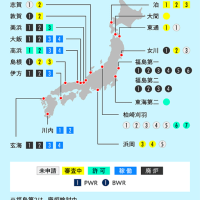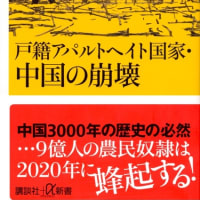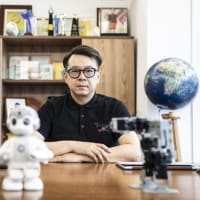' A Buddhist Says.'
06/15/2012 Asahi Shimbun
http://www.asahi.com/news/intro/OSK201206060129.htm
Tetuen Nakajima, chief priest "the nuclear power plant realized on others' sacrifice is [ Nakajima ] contrary to Buddhistic ethics" / The Asahi Shimbun (June 15)
There are priests who appeal against realization of society without a nuclear power plant, and are walking involving the national nuclear power plant today.
The priests of Japanese mountain Myoho-ji which visited the Ishikawa prefecture by <reference "a march of a life">
("-- a priest -- a march --a nuclear power reactor fadeout -- appealing -- Ishikawa -- a prefecture -- etc. -- a request -- a sentence -- " -- Asahi Shimbun June 7)
The strong voice which asks for abolition of a nuclear power plant blew off from the Buddhism community after the Fukushima nuclear power plant disaster last year.
That is common to these voice is the historical view that following silently the fundamental view of "living considering others' pain as pain of one", and the "national policy" of atomic power is repeating the fault which the Buddhism community in Japan committed in a previous war.
I introduce today an interview to the Tetuen Nakajima , chief priest of the temple of the Shingon sect in Obama in Fukui Wakasawan in which many nuclear power plants are held, and the Myotuji temple.
"Japan has to improve a nuclear energy policy to all the corners". Tetuen Nakajima.
When I was a student, I was interested only in literature or art.
It was taken to the friend in 1963 and went out for the peace march of the nuclear weapon contrary.
Then, it met the A-bomb victim contaminated by atomic bombing in Hiroshima.
They were those who were able to return from the front of war to Hiroshima.
Although it talked about the poetry made from itself, after it was ready for dying and going to the battlefield, in the poetry, experience which will return to Japan after all and will be knocked down by the illness by contamination was told.
I had the heart deeply moved to the conflict which the A-bomb victim holds into a breast.
And it came to participate in a peace movement.
The atomic bombing to Hiroshima and Nagasaki is the occurrence which occurred in the end of war advanced as a national policy.
The accident in the first nuclear power plant of Fukushima occurred in the end of the nuclear propulsion policy made into a national policy till then last year.
These two occurrences have overlapped for me.
It is not what both occurred within a night in.
Historical feeling is required in order to consider that these two occurrences occurred why.
If rough and ready re-operation of the Oi nuclear power plant is allowed, it will lead to the second Fukushima accident being caused.
Then, people of nuclear unevenness will give up a nuclear propulsion policy at last for the first time.
It is not very much for many people to make a clear decision for still separating from atomic power.
But it is too late, even if everybody repents a crime after the second Fukushima accident occurs.
The nuclear safety myth did not collapse by the Fukushima nuclear power plant disaster.
From that time of a nuclear power plant being forced on villages which is Japanese every place and which the village left, it had already collapsed.
It is because isolation of the nuclear power plant was based on an understanding that such plant is the dangerous institutions which cannot be stood to the suburbs of the major cities.
The governors of the Kansai area were opposed to re-operation of the Oi nuclear power plant temporarily.
If an accident occurs, their prefectures will also be from the reason for suffering damage.
However, they changed the attitude quickly and recognized re-operation as a matter of fact.
These governors' argument is completely irrelevant.
It is because the history of the atomic power over 50 years cannot be thought over comprehensively.
There is a thing "study others' pain and pain to a part of preaching of the ethics taught by Buddhism, and accept in it as your a thing."
In such a sense, people must not pursue their happiness at the sacrifice of others.
I think that an argument for me to free myself from the dependence to atomic power is what starts about the social system of the framework of the whole nuclear energy policy, and mass production and mass consumption only after performs synthetic and fundamental reexamination.
("Tetsuen) [ Kentaro Isomura, ] Nakajima: Japan must. thoroughly re-examine. nuclear energy policy", The Asahi Shimbun, 2012.06.15)http://ajw.asahi.com/article/0311disaster/opinion/AJ201206150082
坊さんのことば。
06/15/2012 朝日新聞
http://www.asahi.com/news/intro/OSK201206060129.html
「他人の犠牲の上に成り立つ原発は、仏教の倫理に反している」中島哲演住職/The Asahi Shimbun(6月15日)
今日、原発の無い社会の実現を訴えて全国の原発を巡り歩いている僧侶たちがいます。
<参考>「命の行進」で石川県を訪れた日本山妙法寺の僧侶たち。(「僧侶ら行進『脱原発』訴え 石川県などに要請文」朝日新聞 6月7日)
昨年の福島原発事故以降、仏教界からは原発の廃止を求める強い声が噴き出しました。これらの声に共通するのは、「他人の苦しみを自分の苦しみとして生きる」という根本的な考え方、そして原子力という「国策」に黙って従うことは先の戦争で日本の仏教界が犯した過ちを繰り返すことである、という歴史観です。
今日は多くの原発を抱える福井県若狭湾の小浜にある真言宗の寺、明通寺(みょうつうじ)の中島哲演(なかじま てつえん)住職へのインタビューを御紹介します。
「日本は、原子力政策を隅々まで見直さなければならない」 中島哲演
私が学生だった頃、私は文学や芸術にしか興味がありませんでした。それが1963年に、友人に連れられて核兵器反対の平和行進に出かけたのです。そこで、広島での原爆投下で被爆された被爆者に出会いました。戦争の前線から広島に戻ってこられた方でした。御自分で作られた詩について話してくださったのですが、その詩の中では、死ぬことを覚悟して戦地に赴いた末に、結局は日本に戻り被ばくによる病に打ちのめされることになった経験が語られていました。私はその被爆者が胸の中に抱える葛藤に深く心を動かされました。そして、平和運動に参加するようになったのです。
広島と長崎への原爆投下は、国策として進められた戦争の終わりに起きた出来事です。
昨年、福島第一原発での事故が、それまで国策とされてきた原子力推進政策の終わりに起きました。私にとって、これらの二つの出来事は重なっています。どちらも一晩のうちに起きたことではありません。なぜこれらの二つの出来事が起きたのかについて考えるためには、歴史の感覚が必要です。
もし大飯原発の拙速な再稼働を許せば、第二の福島事故が引き起こされることにつながるでしょう。そうして初めて、原子力ムラの人びとはやっと原子力推進政策を諦めることでしょう。多くの人びとが、まだ原子力から離れるための明確な決断を下すには至って居ません。でも、第二の福島事故が起きた後で皆が罪を悔いても、遅すぎるのです。
原子力の安全神話は、福島原発事故で崩壊したのではありません。原発が日本各地の人里離れた村々に押しつけられたその時から、既に崩壊していたのです。なぜなら、原発の隔離は、これらの発電所は主要都市の近郊には立てることができない危険な施設だとの理解に基づいていたからです。
関西地域の知事たちは、一時は大飯原発の再稼働に反対しました。事故が起きれば彼らの府県も被害を受けるという理由からです。しかし、彼らは素早く態度を変えて再稼働を事実上承認しました。これらの知事の議論は、全く的外れです。50年にわたる原子力の歴史を包括的に考え直すことができていないからです。
仏教で教える倫理の説法の一部に、他人の痛みや苦しみを学び、自らのものとして受け入れよ、というものがあります。そうした意味では、人は他人を犠牲にして自らの幸せを追求してはならないのです。私は、原子力への依存から脱却するための議論は、原子力政策全体の枠組みと大量生産・大量消費の社会システムについて総合的かつ根本的な再検討を行って初めて始まるものだと思います。
(Kentaro Isomura,“Tetsuen Nakajima: Japan must thoroughly re-examine nuclear energy policy”, The Asahi Shimbun, 2012.06.15)
http://ajw.asahi.com/article/0311disaster/opinion/AJ201206150082




















※コメント投稿者のブログIDはブログ作成者のみに通知されます